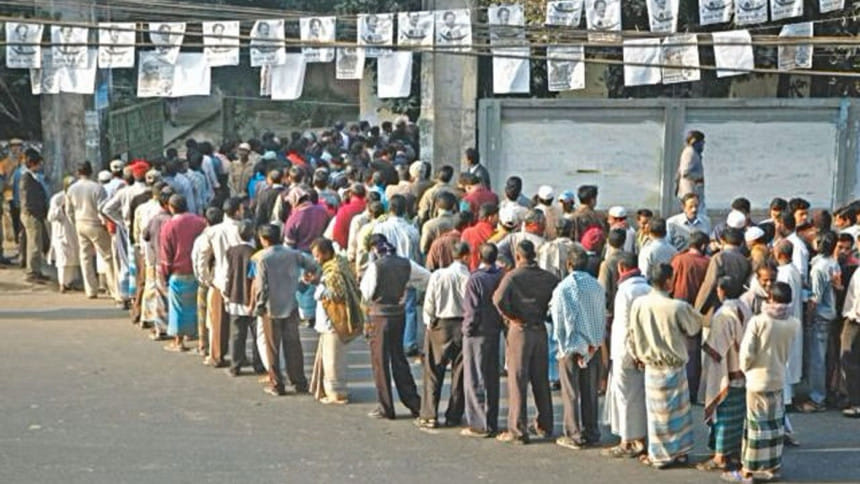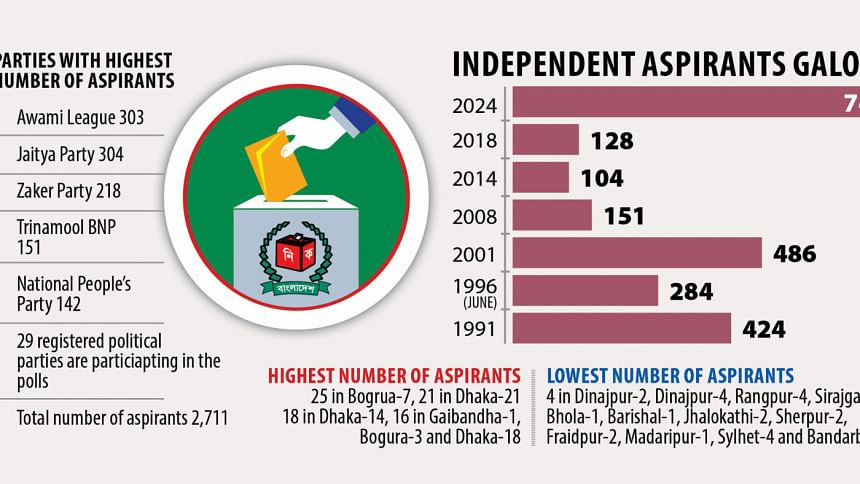Independents all-time high

The number of independent aspirants submitting nomination papers for the upcoming national polls is at an all time high.
Election Commission data shows that a total of 747 independent aspirants submitted nomination papers till Thursday, the last date of submission.

Experts said more independent candidates are vying for office as the ruling Awami League decided to allow independents to raise voter turnout.
AL sources said at least 442 party leaders have submitted nominations; among them, around 60 incumbent lawmakers were denied party tickets.
RISE OF INDEPENDENTS
Although EC did not publish official data on how many candidates in total filed nomination papers, highly placed sources in the EC told The Daily Star the number was 2,711.
During the 2018 election, a total of 498 independent aspirants filed nominations, and of them, 128 vied as candidates, according to EC.
A total of 39 political parties, including all major political parties, took part in that election.
In 2014, around 150 independent aspirants submitted nominations, and of them, 104 ran in the polls. Only 12 political parties contested amid boycotts by the BNP and other opposition parties, resulting in 153 lawmakers getting elected unopposed.
There were 120 independent candidates in 1973, 422 in 1979, 453 in 1986, 214 in 1988, 424 in 1991, 284 in 1996, 486 in 2001, and 151 in 2008 elections, EC data shows.
AL Joint General Secretary AFM Bahauddin Nasim said, "The party is allowing candidates to vie as independents to make the election more competitive. More candidates mean higher voter turnout; that is also on our minds. But as a disciplined party, Awami League will control the independent candidates if necessary."
"Awami League has taken up a strategy to allow independent and dummy candidates to raise the number of participants."
Shushashoner Jonno Nagorik (Shujan) Secretary Badiul Alam Majumdar said the ruling party's decision was key for the record number of independents this time.
"They [AL] have taken up a strategy to allow [its leaders to run as] independent and dummy candidates to raise the number of participants, so that the election is among themselves," he said.
"The position of lawmaker is 'a golden deer' for many. If they become lawmakers, they will be able to get money and fame, as well as supremacy in the area. That is why so many people want to be lawmakers," Badiul said.
Meanwhile, BNP and its allies boycotted the polls as they were demanding the election under a non-party polls-time administration.
But the government rejected the demand, prompting the opposition parties to reject the polls schedule announced on November 15.
PARTY WISE ASPIRANTS
The number of AL aspirants is 303, with two contenders each nominated for five seats; while there are 304 aspirants from Jatiya Party, with two contenders each nominated for 18 seats.
Jatiya Party (JP-Manju) has 20 candidates, Bangladesher Samyabadi Dal has six, Krishak Shramik Janata League has 34, Gonotantri Party has 12, Bangladesh National Awami Party (NAP) has six, Workers Party of Bangladesh has 33, Bikolpodhara Bangladesh has 14, Jatiya Samajtantrik Dal (Inu) has 91, Zaker Party has 218, Bangladesh Tarikat Federation has 47, Bangladesh Kelafat Andolon has 14, Bangladesh Muslim League has two, National People's Party has 142, Gono Forum has nine, Gono Front has 25, Bangladesh Jatiya Party (Mukit) has 13, Islamic Front Bangladesh has 39, Bangladesh Kalyan Party has 18, Islami Oikya Jote has 45, Bangladesh Islami Front has 37, Bangladesh Muslim League (Panja) has five, Bangladesh Sangskritik Muktijote has 74, Bangladesh Nationalist Front has 55, Bangladesh Congress has 116, Trinamool BNP has 151, Bangladesh Nationalist Movement has 49 and Bangladesh Supreme Party has 82.
Political analysts say that these parties are mostly AL allies, and little-known and newly-formed parties.


 For all latest news, follow The Daily Star's Google News channel.
For all latest news, follow The Daily Star's Google News channel. 




Comments